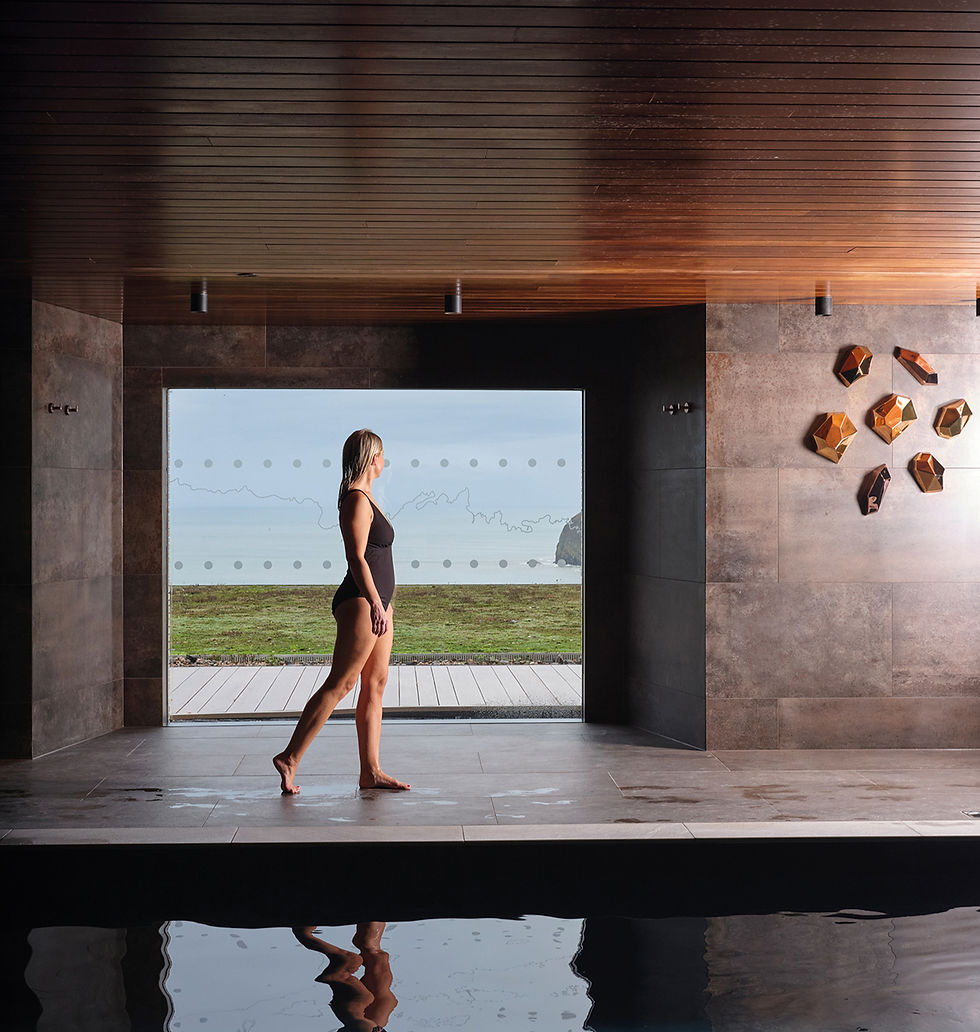Coastal Property Evolution
- Jul 3, 2025
- 7 min read
Words by Jamie Crocker
Jackson Stops adapts traditional estate agency values for modern buyers.

Mark Price speaks with the measured cadence of someone who has watched an industry transform. He represents a generation that bridges the analogue certainties of established property practice with the digital imperatives of contemporary marketing. His employer, Jackson Stops, has been navigating similar territory since 1910, when the company first established itself as a purveyor of country estates to the discerning classes.
The Cornwall office operates from a different landscape now. Where once the firm concentrated solely on grand rural properties, Mark explains how the business has expanded to embrace coastal properties across the million-pound threshold. “We’ve maintained our traditional, high-quality service while adapting to modern buyer expectations,” he says, describing an evolution that mirrors the broader changes affecting Cornwall’s property market.
The county presents a curious paradox. Here, a post-war bungalow with three modest bedrooms can command seven figures purely due to its proximity to the Atlantic. Mark acknowledges this reality without sentiment. “The coastal aspect drives significant value,” he observes. “You could have a family home one street back from a multi-million-pound waterfront property. It’s really interesting how these two markets run parallel.”
This duality extends beyond pricing into distinct buyer demographics. Second home purchasers and investors operate alongside locals seeking permanent residence, creating what Mark describes as “slight rivalry between the two parties.” The tension is real but incomplete. Local businesses depend heavily on the income generated by temporary residents and holiday rentals, creating an economic interdependence that complicates simple narratives about gentrification.

Jackson Stops has adapted its marketing approach to accommodate shortened attention spans that would have horrified previous generations of estate agents. “25 years ago, the average attention span was something like 25 seconds,” Mark notes. “Now it’s about three seconds.” This compression demands precision in initial property presentation, where agents have perhaps two or three photographs and a brief text description to capture interest on platforms like Rightmove.
The challenge has pushed the company toward more sophisticated visual marketing. Drone photography now features in approximately ninety per cent of their listings, particularly valuable for coastal properties and estates with significant land holdings. Social media channels receive increasing attention, though Mark maintains a pragmatic view of these developments. “Unless you want to pay for advertising, you need to be on there,” he explains, echoing the resignation of many who recognise the commercial necessity while questioning the broader cultural implications.
Remote working has fundamentally altered buyer requirements in ways that extend beyond simple home office provision. “A lot of buyers are saying they want either a five-bedroom house or four bedrooms plus a study,” Mark reports. “Even people who don’t necessarily work from home want the option of having a study.” This shift has influenced how Jackson Stops markets existing properties, with small rooms near driveways now routinely described as potential studies, recognising their appeal to contemporary purchasers. Sustainability considerations have gained prominence, though not always for environmental reasons. Solar panel installations and battery storage systems attract buyers primarily because they reduce operating costs rather than carbon footprints. Mark cites one property where comprehensive renewable energy systems resulted in monthly electricity bills of just £17 pounds despite heating, lighting, and powering a hot tub in a substantial family home. “When buyers see that, they’re very pleasantly surprised,” he observes.
The company has developed expertise in marketing what he terms ‘lifestyle’ rather than merely property. This approach recognises that purchasers invest emotionally in the experiences a location might offer rather than focusing solely on architectural features or room dimensions. “Whether that’s on the north coast with surf and sunsets, or down south with waterfront access, we try to convey the lifestyle that property can enable someone to have,” he explains.
The sophistication of this approach becomes apparent when examining Jackson Stops’ treatment of different coastal environments. A waterfront property near Fowey offers entirely different recreational possibilities than one positioned on the Atlantic-facing coastline around Newquay. The former might emphasise sheltered creek moorings and gentle river walks, while the latter focuses on surfing culture and dramatic clifftop perspectives. Mark speaks of “selling that lifestyle where kids can crab down in the creek while parents sit on the quay with a drink, watching the sun go down.”
This philosophy extends to understanding regional variations within Cornwall itself. The lifestyle offered in Padstow differs significantly from that available in nearby villages, despite both locations sharing coastal positions. Jackson Stops positions itself as capable of articulating these distinctions to potential buyers, many of whom arrive from London or the home counties with limited knowledge of local variations.
The agency’s database of pre-qualified buyers enables targeted marketing that matches specific properties with appropriate purchasers. This system reflects decades of accumulated knowledge about buyer preferences and price points, allowing agents to identify potential matches before properties reach general marketing. Such an approach reduces time on market while ensuring that vendors receive offers from genuinely interested parties rather than casual browsers.
Cultural concerns often arise among relocating buyers accustomed to metropolitan amenities. Mark addresses these practically, noting that nowhere in Cornwall requires more than an hour’s travel to reach alternative destinations. The Hall for Cornwall in Truro provides theatrical productions, while restaurants in locations like Rock, Padstow, and Fowey offer sophisticated dining options. However, he suggests that most purchasers relocate specifically to escape urban complexity rather than replicate it. Improved connectivity has reduced Cornwall’s historical isolation. Regular flights from Newquay to London airports enable residents to maintain professional and social connections with the capital while enjoying rural lifestyles. “You can finish in the office at 5:30pm and be in central London by 10pm,” Mark explains, describing weekend trips that were impractical when road travel constituted the only viable option.
The agency maintains discretion as a core principle, protecting both vendor and purchaser identities until formal offers are accepted. This approach serves multiple purposes, from preventing prejudicial negotiations to protecting holiday rental businesses that might suffer if ownership changes became public knowledge prematurely. “We naturally give buyers discretion,” he states. “By doing that, you’re only going to create fair negotiation.”
Professional discretion has become increasingly valuable in Cornwall’s property market, where high-profile purchasers might otherwise face prejudicial treatment or unwanted publicity. The county’s appeal to celebrities and business leaders requires agents capable of managing transactions without attracting media attention or creating local resentment. Jackson Stops’ established reputation for confidentiality attracts clients seeking privacy alongside professional competence.
The firm’s approach to property marketing reflects broader changes in how premium real estate is presented to potential buyers. Where previous generations might have relied on classified advertisements and word-of-mouth recommendations, contemporary marketing requires sophisticated brochures, professional photography and strategic placement across multiple platforms. The company produces both PDF and printed marketing materials, recognising that different buyer demographics prefer different information formats.
Mark observes that the property market has become increasingly competitive, requiring agents to differentiate themselves through service quality rather than simply property access. “Part of our USP is being able to differentiate the areas and actually sell those lifestyles,” he explains, suggesting that success depends on understanding local markets at granular levels rather than treating Cornwall as a homogeneous region.
The evolution of buyer expectations has required Jackson Stops to expand its service offerings beyond traditional estate agency functions. Clients increasingly expect agents to provide guidance on everything from local schools and medical facilities to recreational opportunities and community activities. This expanded brief reflects the reality that property purchases often represent complete lifestyle changes rather than simple accommodation upgrades.
Jackson Stops has expanded beyond its traditional country estate focus while preserving the service standards that established its reputation. The company now maintains dedicated staff in Wadebridge, developing what Mark describes as an ‘organically evolving’ homes department targeting properties at various price points. This diversification acknowledges market realities while maintaining the firm’s association with premium properties.
The expansion into more accessible price ranges reflects recognition that Cornwall’s property market extends beyond the ultra-premium sector. Family homes between established price brackets represent significant business opportunities, particularly as the county attracts younger professionals and families seeking alternative lifestyles. This demographic shift has influenced both the types of properties Jackson Stops markets and the services it provides to support them.

Technology adoption has accelerated throughout the industry, but Jackson Stops maintains focus on personal relationships and local knowledge as differentiating factors. While drone photography and social media presence are now essential marketing tools, Mark emphasises that these technologies supplement rather than replace traditional client service. The firm’s success depends on understanding individual client requirements and matching them with appropriate properties through personal consultation rather than algorithmic recommendation systems.
The challenge of maintaining service quality across different market segments requires careful resource allocation and staff training. Agents working on million-pound coastal properties develop different skills from those handling family homes in market towns, yet both require an understanding of local conditions and buyer motivations. Jackson Stops’ ability to serve diverse markets while maintaining consistent professional standards reflects the adaptability that has sustained the company through more than a century of market evolution.
Cornwall’s property market continues attracting buyers from across the United Kingdom, drawn by natural beauty and improved connectivity. Jackson Stops has positioned itself to serve these purchasers while maintaining relationships with local buyers operating at different price points. The company’s adaptation demonstrates how traditional estate agency principles can accommodate contemporary market conditions without abandoning the discretion and service quality that established its reputation over more than a century of operation.
Economic uncertainty continues to influence buyer behaviour and market conditions, though Mark suggests that Cornwall’s appeal transcends short-term financial concerns. The county offers tangible lifestyle benefits that justify premium pricing for many purchasers, particularly those relocating from high-cost urban areas where equivalent amenities are unavailable.
Mark Price represents a generation comfortable with technological marketing tools while maintaining appreciation for personal service and professional standards. His presence within the organisation suggests continuity between traditional values and modern methods of marketing properties in the 21st century.
















